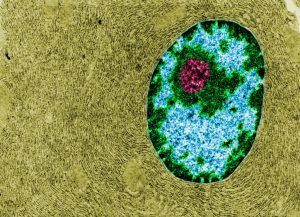JoAnna Klein in The New York Times:
 Once there was a mutant worm in an experiment. It lived for 46 days. This was much longer than the oldest normal worm, which lived just 22. Researchers identified the mutated gene that had lengthened the worm’s life, which led to a breakthrough in the study of aging — it seemed to be controlled by metabolic processes. Later, as researchers studied these processes, all signs seemed to point to the nucleolus. Under a microscope, it’s hard to miss. Take just about any cell, find the nucleus, then look inside it for a dark, little blob. That’s the nucleolus. If the cell were an eyeball, you’d be looking at its pupil. You’ve got one in every nucleus of every cell in your body, too. All animals do. So do plants, and yeast — and anything with a cell with a nucleus. And they’ve become much more important in our understanding of how cells work. “We think the nucleolus plays an important role in regulating the life span of animals,” said Adam Antebi, a cellular biologist at the Max Planck Institute for Biology of Ageing in Germany. He’s an author of a new review published last week in Trends in Cell Biology that examines all the new ways that researchers have fallen in love with the nucleolus — especially its role in aging.
Once there was a mutant worm in an experiment. It lived for 46 days. This was much longer than the oldest normal worm, which lived just 22. Researchers identified the mutated gene that had lengthened the worm’s life, which led to a breakthrough in the study of aging — it seemed to be controlled by metabolic processes. Later, as researchers studied these processes, all signs seemed to point to the nucleolus. Under a microscope, it’s hard to miss. Take just about any cell, find the nucleus, then look inside it for a dark, little blob. That’s the nucleolus. If the cell were an eyeball, you’d be looking at its pupil. You’ve got one in every nucleus of every cell in your body, too. All animals do. So do plants, and yeast — and anything with a cell with a nucleus. And they’ve become much more important in our understanding of how cells work. “We think the nucleolus plays an important role in regulating the life span of animals,” said Adam Antebi, a cellular biologist at the Max Planck Institute for Biology of Ageing in Germany. He’s an author of a new review published last week in Trends in Cell Biology that examines all the new ways that researchers have fallen in love with the nucleolus — especially its role in aging.
You may have forgotten this from biology class, but the nucleolus is the cell’s ribosome factory. Ribosomes are like micro-machines that make proteins that cells then use for purposes like building walls, forming hairs, making memories, communicating and starting, stopping and slowing down reactions that help a cell stay functioning. It uses about 80 percent of a cell’s energy for this work. But there’s more to the nucleolus than just making ribosomes. If building a cell were like building a building, and the DNA contained the blueprint, the nucleolus would be the construction manager or engineer. If building a cell were like building a building, and the DNA contained the blueprint, the nucleolus would be the construction manager or engineer. “It knows the supply chain, coordinates all the jobs of building, does quality control checks and makes sure things continue to work well,” said Dr. Antebi. How well it balances these tasks influences a cell’s health and life span. And in certain cells, its size has something to do with it.
More here.
